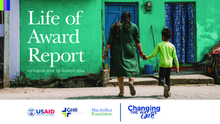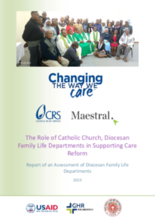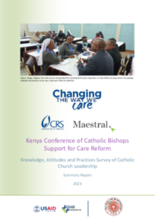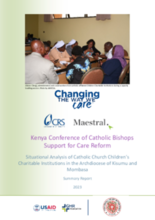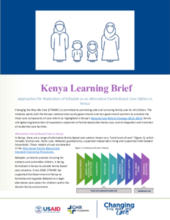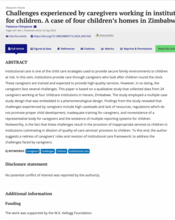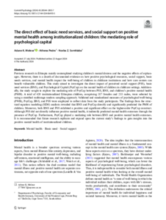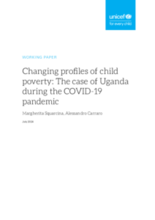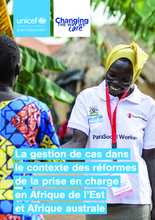Displaying 21 - 30 of 665
The Changing the Way We Care℠ (CTWWC) Life of the Award Report highlights the initiative’s global efforts to promote safe, nurturing family care for children. Since 2018, CTWWC has been driving care reform in countries like Guatemala, Kenya, and Moldova, while supporting smaller projects in Haiti and India.
The 2023 assessment of Diocesan Family Life Departments (FLDs) in Kenya, conducted by the Kenya Conference of Catholic Bishops (KCCB) in collaboration with Changing the Way We Care℠ (CTWWC), highlights the Church’s critical role in advancing care
In 2023, the Kenya Conference of Catholic Bishops (KCCB) conducted a Knowledge, Attitudes, and Practices (KAP) survey, in partnership with Changing the Way We Care℠ (CTWWC), to assess the readiness of Catholic church leadership and workers i
This study aimed to gather data on Catholic Church Children’s Charitable Institutions (CCI) operations in Kenya, the children they serve, and the challenges they face, to inform future care reform strategies.
This learning brief explores the formalization and replication of Kafaalah, an Islamic practice of caring for orphans and vulnerable children, as an alternative family-based care option in Kenya.
This paper is based on a qualitative study that collected data from 24 caregivers working at four childcare institutions in Harare, Zimbabwe. Findings from the study revealed that challenges experienced by caregivers include high caseloads and lack of resources, regulations which do not promote proper child development, inadequate training for caregivers, and nonexistence of a representative body for caregivers and the existence of multiple reporting systems for children.
This study aimed to investigate the direct impact of perceived social support, basic need services, and Psychological Capital on the mental health of children in childcare settings in Ethiopia.
This study examines the socioeconomic determinants of COVID-19-induced poverty among households with children in refugee-hosting districts of Uganda, comparing refugee and host households. It also investigates the role of social assistance in preventing poverty.
Este artigo explora o papel da avaliação e gestão de caso no contexto das reformas do sistema de cuidados alternativos. Oferece princípios transversais de boas práticas, as etapas essenciais e descreve os fatores críticos envolvidos nas práticas de avaliação e gestão de caso eficazes. Baseando-se na literatura da região, o artigo visa fornecer uma orientação abrangente aos profissionais e às partes interessadas envolvidas nos cuidados, no bem-estar e na proteção das crianças. O anexo fornece detalhes dos recursos de avaliação e gestão de caso da região da África Oriental e Austral e também em outros lugares.
Ce document explore le rôle de la gestion de cas dans le contexte des réformes de la prise en charge. Il propose des principes transversaux de bonnes pratiques, des étapes essentielles et décrit les facteurs critiques impliqués dans des pratiques efficaces de gestion de cas. S’appuyant sur la littérature de la région, ce document vise à fournir une orientation générale aux professionnels et aux acteurs impliqués dans la prise en charge, le bien-être et la protection de l’enfance. L’annexe fournit des détails sur les ressources en matière de gestion de cas dans la région de l’Afrique de l’Est et australe ainsi qu’au-delà.

